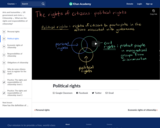
An overview of Political rights. Created by Kimberly Kutz.
- Subject:
- Political Science
- Social Science
- Material Type:
- Lesson
- Provider:
- Khan Academy
- Provider Set:
- Khan Academy
- Author:
- Kim Kutz
- Date Added:
- 07/16/2021

An overview of Political rights. Created by Kimberly Kutz.
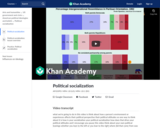
Factors that influence an individual's political attitudes and values.

Ponzi Schemes. Created by Sal Khan.

Popular Sovereignty and the Consent of the Governed: The Founders believed that the government’s authority needed to come from the people. Under the reign of King George III, the colonists believed that they were deprived of their opportunity to consent to be governed by Parliament through representatives, and, therefore, the British could not force their laws upon the colonies. The Founders made sure to uphold this right in the American Constitution. The people, through their representatives at state ratification conventions, had to ratify the document in order for it to become law.

iCivics Google Slides presentation about the election of the president. Shows difference between electoral vote and the popular vote. Pros and Cons of Electoral College. Perspective defense.

Explore this interactive art piece from the Colonial Williamsburg collection.

This site features Louisa May Alcott and Samuel Clemens. See excerpts from Alcott's girlhood journal and Little Women. Read Clemens' explanation of his white suit in Mark Twain's Autobiography and the last chapter of Tom Sawyer, where Huck Finn has fled the Widow Douglas's civilizing influence. Help students see that their own lives and views can be a basis for creative writing.

SLANT is a management tool for teachers that encourages Positive Non-Verbal Behavior and Active Listening.
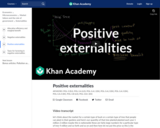
What happens when all of the benefits of consumption are not captured in a demand curve? In this video we explore how to think about positive externalities in a market setting. Created by Sal Khan.

Case background and primary source documents concerning the Supreme Court case of Pottawatomie v. Earls. Dealing with students' Fourth Amendment protections when in schools, this lesson asks students to assess the Court's evolving definition of "reasonable" searches with respect to public school students.

This activity is designed to accompany the contextual essay “Permanent Interests: The Expansion, Organization, and Rising Influence of African Americans in Congress, 1971–2007,” from the Black Americans in Congress website, history.house.gov/exhibitions-and-publications/baic/black-americans-in-congress/. Students have the opportunity to learn more about the Black Americans who served in Congress from 1971 to 2007. Students are encouraged to analyze the role African-American Representatives and Senators played in Congress during this era, as well as the ways in which they may have changed the institution.
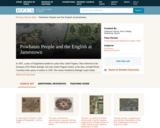
In 1607, a party of Englishmen landed in a place they called Virginia. They followed in the footsteps of Sir Walter Raleigh, who had visited Virginia (which, at the time, included North Carolina) with a party of settlers in 1585. The colony founded by Raleigh’s party failed, weakened by lack of supplies and irregular contact with England.
To the people who already lived in the area, this was the land of the Powhatan Confederacy, a vast regional network of allied communities living under the leadership of Wahunsenacah (also known as Powhatan). Contact between the English and the people of the Powhatan confederacy was fraught with misunderstanding and conflict. This owed a great deal to the fact that the English were in the Americas to form a colony and make money for the Virginia Company of London, the corporation that had launched them on their voyage west. The Powhatan, on the other hand, lived out their values of kinship, allyship, and reciprocity in a way that was at first incomprehensible to the English, and that later they firmly rejected.

In this lesson, students will learn about the work and life of Cotton Mather and how it was shaped by his purpose. They will explore how his actions and his identity helped him achieve a great advancement for modern medicine and through his example, learn how they can pursue their own purpose for the greater good of mankind.

Why are prayers at meetings of government bodies constitutional? Students learn why in this lesson on the Supreme Court's landmark 2014 decision of Town of Greece v. Galloway from Teach Democracy's BRIA curricular magazine. Access to this resource requires a free educator login.
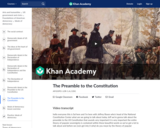
The Preamble is the introduction to the US Constitution, but it's so much more than that. In this video, Sal discusses the Preamble with Jeffrey Rosen, President and CEO of the National Constitution Center.

The Preamble to the U.S. Constitution summarizes the Founding Fathers’ intention to create a federal government dedicated to ensuring that “We the People” always live in a safe, peaceful, healthy, well-defended—and most of all—free nation.
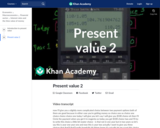
More choices as to when you get your money. Created by Sal Khan.
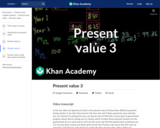
What happens when we change the discount rate? Created by Sal Khan.
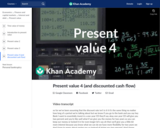
Discounted cash flows are a way of valuing a future stream of cash flows using a discount rate. In this video, we explore what is meant by a discount rate and how to calculated a discounted cash flow by expanding our analysis of present value. Created by Sal Khan.

From Tippecanoe and Tyler Too to Yes, We Can, students will trace the development and use of slogans in presidential elections in the United States. The lesson allows students to compare slogans that are issue-related to those that are more generic. Students are then asked to analyze how these types of slogans are used and the effects they are meant to have on voters.
Note: The resources needed for this lesson can be found at the bottom of this webpage: https://www.civiced.org/voting-lessons